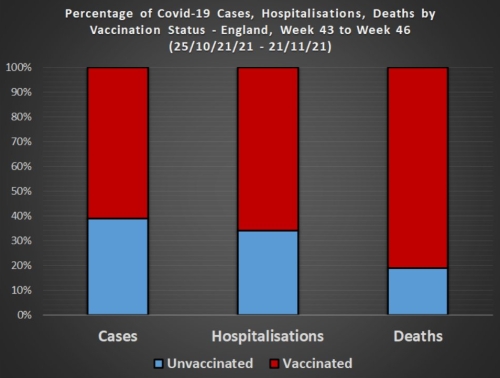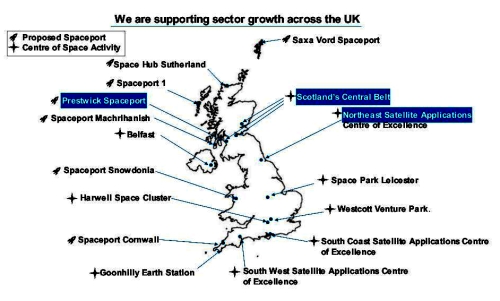
The graph to the right was created from the data produced by the United Kingdom Health Agency covering the period from October 25, 2021 to November 21, 2021. It shows the percentages of the vaccinated and unvaccinated individuals who became infected with COVID, were hospitalized by it, and even died from it.
As you can clearly see, it apparently makes no difference anymore whether you received no shots, one shot, two shots, or three shots. Your chances of getting infected with COVID is just as likely if you are vaccinated than if you are not. The shots don’t protect you.
The graph is part of a long article detailing how in the UK, COVID appears to no longer be a virus of the unvacccinated, but in fact is now a virus of the vaccinated. Apparently, you stand a higher chance of getting sick from COVID if you have been vaccinated than if you have not.
The story however distorts the truth badly, since it exaggerates the danger. This graph was produced based on these numbers:
The report reveals that there were 833,332 recorded Covid-19 cases, 9,094 Covid-19 hospitalisations and 3,700 Covid-19 deaths from October 25th to November 21st.
When we run the actual number of deaths against the number of people infected with COVID, whether vaccinated or not, we find that 99.5% easily survive the illness. This confirms previous numbers I have cited covering the entire United States. COVID, like the flu, is relatively harmless to almost the entire population. Only the elderly, the sick, and the chronically ill are threatened seriously by it.
So, what take-away should we take from this information?
1. All vaccine mandates are irrational. They do nothing to reduce the risk of COVID. To impose such rules based on this data suggests that the Biden administration is completely divorced from reality in its policy making.
2. The virus itself is not a serious threat and never was. 99.5% of everyone survives it. Since we now know that the lockdowns, the mask mandates, the vaccines, the installation of plexiglass everywhere, and the social distancing rules did nothing to limit its spread, we should stop all these crazy irrational policies now. Return to normal life, and let the virus finally spread through the population in a way that will allow natural immunity to build up. Only then can we finally choke this thing off for good.
I think the public is finally ready. I think that most everyone is sick and tired of stupid rules and irrational policies and will resist strongly any attempts at new rules. You might see them imposed in fascists states like California and New York, but in general the country, even the world, is ready to tell power-hungry politicians to go jump in a lake.



